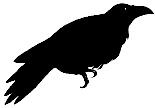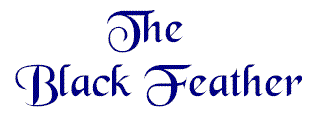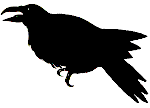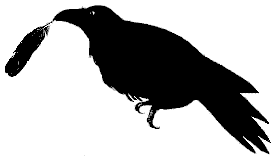





hen one begins to follow a certain sort of path through life---a magical path, let's say, for want of a better term---the way at first is often difficult to see. It is important then that one be an attentive traveler, watching and listening carefully to all that enters into one's sphere of knowing. There are many signposts that will mark the traveler's way, but one must be attentive to see such things for what they truly are.
The black feather shown below is a token, which is a sort of signpost that has a physical form and remains with the traveler for a time. Tokens, I am given to understand, generally come to us in the earlier stages of our magical journeys. They serve both as reminders of a certain stage one has come to along the way, and---more importantly---as objects of contemplation that can give one the strength and courage to continue. They bear a relationship to---but are distinct from---power objects, which sometimes appear as one progresses further.
Near the building where I work there is a gently rolling field. I cross it twice each day, rain or shine, leaving the noise and closeness of a fluorescent-lit office for fifteen minutes in the open air.
During my walks I have come to know many of the creatures who live in and around the field. Bees and ladybugs, crickets and grasshoppers, butterflies, moths, and dragonflies, meadow larks and redwing blackbirds---all have come and gone with the changing seasons. All have been watched by me with a certain pleasurable fascination, but none so much as the red-tailed hawks and crows.
As you may know already---or as you may come to know, if it is a part of your own magical journey---there are those who feel strong connections with one or more species of the Animal Kingdom. There is, of course, ancient precedent for such relationships; tribal folk have long referred to creatures with whom magical connections are felt as totem animals. Speculation on why this should be might lead us into lengthy digression at this point, so I will say now only that relationships of this sort actually exist, and that the past summer was the time when I discovered my own relationship with hawk and crow. Each discovery was the culmination of a gradual process of growing awareness, unfolding at last in a revelatory event of deep personal significance. The black feather is my token of one of these events . . .
t was a Sunday afternoon toward the end of summer. I had gone to visit a grove not far from where I live, and had passed an hour or two taking photographs of the wonderful old oaks someone had planted there a century before. As evening approached the air grew still. The heat and humidity soon became oppressive. It occurred to me that the open field near my office would be somewhat more pleasant. Besides, I had my camera, and might get a shot of one of the crows or hawks that had so occupied my attention of late.
I pulled my truck off the road on the edge of the field and got out. At that precise moment---as if cued by a director with a penchant for low comedy---a red-tailed hawk suddenly appeared out of nowhere, glided directly over my head, then flapped casually away toward the tree line. Surprised, I fumbled with the camera, and missed my chance.
Halfway down the narrow line of woods that bound the north end of the field---only a stone's throw from the old bur oak I visit during my walks---there stands a skeletal deadwood tree. It rises out of a tangle of weed and vine and briar in a spot that is marshy throughout the rainy days of spring, but dry throughout the summer. Now, as I watched, a lone crow lit upon the topmost branch.
The local crows have grown accustomed to seeing me out tramping around their field each day, I suppose, and no longer consider me to be a threat. I can often pass within a short distance of them without arousing suspicion or alarm, so I wasn't very much surprised when the lone crow remained as I approached the tree with my camera.
I said Hello, of course. Nothing unusual in that; I most always speak to the animals I meet. It was then, however, that events began to take a decidedly odd turn. I noticed that this particular crow was watching me intently.
As I stood there looking back---with a growing feeling that something important was about to happen---there came a subtle but unmistakable perceptual shift. It's difficult for me to put the feeling of such a thing into words. There was still the uncanny sense of expectation, but now it was accompanied by an odd perception that the passage of time was actually slowing; there was a sense of quiet clarity and of heightening reality, and the focus of my attention suddenly narrowed to include nothing but myself, and the staring black bird. It was then that the extraordinary event occurred:
The crow turned 'round its head, extended a wing, and with a couple of quick tugs plucked out a feather. There was then a flapping of wings, a single loud CAW!, and the crow was gone.
For a breathless moment I watched the feather tumbling downward, silhouetted starkly against the brightness of the sky. During that moment nothing but the feather seemed to exist, then I lost sight of it against the foliage of a smaller oak that stands beneath the limbs of the old dead tree.
The feather, I knew, was meant to be mine. It had been offered to me. My part was to accept it, but to do so was clearly going to entail no small effort. To find so tiny an object hidden somewhere within the dense undergrowth of brush, nettle, briar, and vine would be akin to locating the proverbial needle in its haystack.
Half an hour I spent in futile searching, pushing through shoulder-deep foliage, slapping at mosquitoes, dripping in the heat and humidity with perspiration. I emerged with nothing to show for my effort but clothing torn by thorns, scratches, and random bruises. The sun was getting low, and the task was beginning to seem impossible. Thoroughly discouraged, I turned to leave.
I had not gone more than a few steps, however, when I stopped, and stood considering. Few things of importance come to us easily. Perhaps, I thought, I was at some sort of turning point. Perhaps this was a small test of faith and of worthiness . . .
So, I retraced my steps and climbed back in.
Another interminable fifteen minutes passed as I combed through the near-impenetrable weedy tangle without success. I was now standing beneath the little oak tree, looking up at it. I had begun to suspect that the feather had never reached the ground at all, but had been caught somewhere higher up, out of sight and out of reach.
"I need some help here."
I spoke those words out loud. No sooner had I said them than the leaves trembled with a passing breeze. There was a dark flicker of movement. It was the black feather, drifting down from the upper branches of the oak. It caught on the leaves of a lower branch directly before my face, within easy reach from the very spot where I was standing . . .

© 1998 Gregory S Hargrave (Yopo)